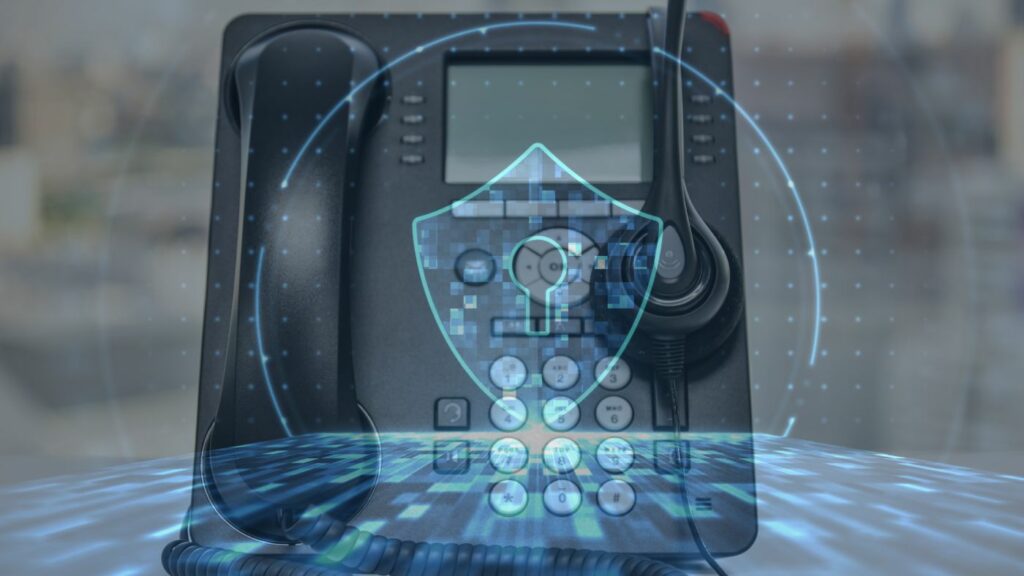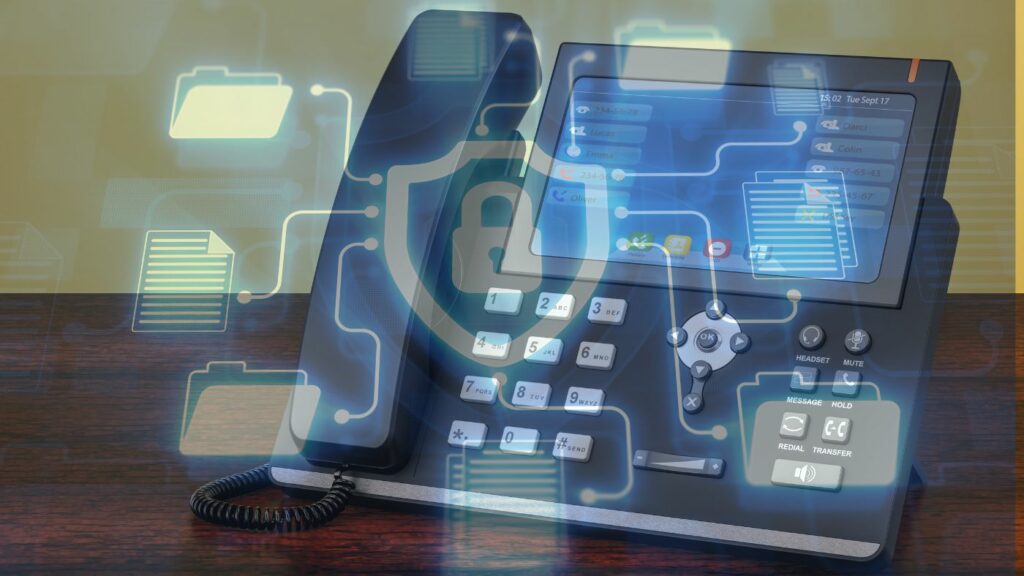In an era of constantly evolving cyber threats, ensuring the security of your VoIP communications is crucial. Many businesses face the persistent problem of inadequate VoIP security, leading to vulnerabilities like eavesdropping, caller ID spoofing, and data breaches. These issues compromise sensitive information and disrupt reliable communication, impacting productivity and trust.
Dealing with these security lapses can be overwhelming. Imagine confidential conversations being intercepted or unauthorised by users exploiting your VoIP system for toll fraud. These scenarios are inconvenient and can lead to significant financial losses and irreparable damage to your reputation.
The solution lies in robust VoIP encryption. By implementing protocols such as TLS and SRTP, you can transform your communication security, ensuring that your voice data remains confidential and secure from cyber threats. With the strategies and best practices outlined in this guide, you can confidently protect your VoIP systems, maintaining the integrity and reliability of your communications.
We encourage you to take proactive steps today. Share your experiences, challenges, and successes in the comments below. How have you tackled VoIP security issues? What encryption practices have you found most effective? Your contributions can provide valuable insights to others in our community striving to enhance VoIP security.
What is VoIP Encryption?
VoIP encryption is a security measure used in Voice over Internet Protocol (VoIP) technology. It protects voice calls by converting voice data packets into unreadable formats as they travel the internet. To ensure confidentiality and protect against eavesdropping, VoIP encryption uses cryptographic algorithms to encode the digital data packets to transmit voice calls. By doing so, only authorised parties with the correct decryption key can convert the scrambled data back into understandable voice communications.

Encryption is crucial as it secures the data exchange process, keeping VoIP calls private and ensuring that the sensitive information shared during conversations cannot be intercepted or deciphered by unauthorised individuals or entities. This process of encryption and decryption happens in real-time, providing a seamless and secure experience for users of VoIP phone systems.
Understanding VoIP Encryption
VoIP systems primarily utilise the Real-Time Transport Protocol (RTP) to deliver audio and video over internet networks. However, RTP in its standard form does not offer encryption, making it vulnerable to security threats. To address this, Secure Real-time Transport Protocol (SRTP) has been developed to add encryption, message authentication and integrity, and replay attack protection to RTP data.

Implementing SRTP requires that both the sender and receiver of the VoIP traffic have a shared secret key, used to encrypt and decrypt the messages. The keys are established through cryptographic protocols like the ZRTP (Zimmermann Real-time Transport Protocol) for establishing a shared secret between two VoIP endpoints dynamically, or the use of a Public Key Infrastructure (PKI) where keys are pre-shared and managed.
Proper security measures also involve utilising Transport Layer Security (TLS) to encrypt the signalling traffic, which includes the initiation and termination of the VoIP calls, as well as the management of sessions.
Importance of VoIP Encryption
Encryption is of paramount importance in maintaining the confidentiality and integrity of voice communications through VoIP technology. As VoIP traffic traverses through various public and private networks, unencrypted voice calls are susceptible to interception which can lead to compromised privacy, eavesdropping, and toll fraud. Encryption is essential to prevent such security risks.

On a business level, securing VoIP communications helps maintain customer trust and ensures regulatory compliance where privacy is mandated. In sectors like healthcare, finance, and legal, where sensitive information is routinely exchanged, VoIP encryption is not just recommended—it is often a strict requirement.
Moreover, with the growing popularity of remote work and the use of mobile devices for business communication, ensuring data security on such devices has become more critical. VoIP encryption on mobile devices is crucial to prevent security breaches that can occur through unsecured public Wi-Fi networks and other vulnerability points.
Lastly, as traditional landlines become obsolete and more businesses and consumers switch to VoIP solutions, the attention to encryption and proper security measures must increase to keep communication secure. VoIP encryption is not just a technical necessity; it is a practice that safeguards the backbone of modern communication — ensuring voice calls remain confidential and intrinsically secure.
How Does VoIP Encryption work?
VoIP encryption employs layers of security protocols that protect the voice data packets as they move across the internet. Here’s how the process typically unfolds:
Initiation: A VoIP phone initiates a call, connecting to another device or VoIP service via the Internet.
Key Exchange: Both call endpoints use a protocol to exchange encryption keys securely. This is often done using the Diffie-Hellman key exchange method, which allows both ends to generate a shared secret key independently.
Encryption: Before voice data is sent over the internet, it is encrypted using the shared key. This key converts the clear, audible voice signals into scrambled data incomprehensible to unauthorised eavesdroppers.
Transmission: The encrypted data is sent over the internet as digital packets.
Decryption: When the data arrives at its intended destination, the receiving VoIP device uses the prearranged shared key to decrypt the data and convert it into audible voice audio.
Continuous Communication: As the call continues, the VoIP devices continuously encrypt and decrypt the transmitted data in real time, maintaining a secure communication channel.
These steps ensure that even if the packets are intercepted, they cannot be deciphered without the unique encryption key, keeping the conversation private and secure.
The Role of Real-Time Transport Protocol (RTP)
The Real-Time Transport Protocol (RTP) is critical in VoIP communication, as it delivers audio and visual data in real time. Typically, RTP doesn’t provide encryption, leading to potential security vulnerabilities. Here’s where RTP’s significance in VoIP encryption comes into play:
Packet Delivery: RTP ensures that the voice data packets are delivered in a sequence and on time, crucial for maintaining the quality of the call.
Identification: RTP provides payload identification, allowing the receiving device to understand what type of data is being received so it can be processed correctly.
Synchronization: RTP supports the synchronization of different data streams, which is vital in video conferencing, where audio and video tracks must be synchronized.
However, due to its lack of encryption, RTP is often paired with Secure Real-time Transport Protocol (SRTP) to provide the necessary security for VoIP calls. Additionally, integrating cloud PBX systems can enhance the overall communication infrastructure, offering scalable and secure solutions for managing VoIP services. Cloud PBX leverages internet-based technologies to provide advanced features and flexibility, further supporting the secure and efficient use of RTP and SRTP in VoIP communications.
For VoIP calls to be securely encrypted, certain measures and protocols must be in place:
SRTP: SRTP encrypts RTP packets to ensure the voice data is secure from the sender to the receiver. It uses algorithms such as AES for encryption and SHA-1 for message authentication.
TLS: Transport Layer Security (TLS) encrypts the signalling parts of the VoIP call. By securing the signals that set up and tear down the calls or adjust their parameters midway through a conversation, TLS adds another layer of protection.
Endpoint Security: VoIP devices must be secured with strong passwords and, where applicable, two-factor authentication to prevent unauthorised access.
Network Security: Firewalls, intrusion prevention systems, and secure VPNs are also necessary to protect the network over VoIP calls.
Adherence to these security measures ensures that voice calls are protected from common threats such as eavesdropping, data manipulation, and identity theft, making VoIP encryption a cornerstone of secure internet-based communication.
Benefits of VoIP Encryption
Encryption is a powerful tool for maintaining the confidentiality and integrity of voice communications over the Internet. By converting voice data into a secure code, VoIP encryption ensures that even if data packets are intercepted during transmission, they remain undecipherable to unauthorised parties. This safeguard extends beyond the call itself, protecting the session initiation and termination processes. The benefits of this process are manifold.

Enhanced Security and Privacy
An inherent benefit of encrypting VoIP calls is the significant bolstering of security and privacy for users. A secure lock keeps a diary private, but VoIP encryption ensures conversations remain confidential. This is especially vital for businesses where trade secrets and corporate strategies discussed over VoIP calls could pose lucrative targets for industrial espionage. Encryption shields these voice calls from potential interlopers, rendering any intercepted digital data packets useless in their encoded form.
Table: VoIP Encryption Advantages
| Benefit | Description |
|---|---|
| Security | Protects against unauthorised access and data breaches. |
| Privacy | Keeps conversations private, maintaining personal and business secrecy. |
| Integrity | Ensures the received data has not been altered during transit. |
| Compliance | Meets legal standards and regulations for data protection. |
| Peace of Mind | Offers users confidence in the security of their communications. |
Protection Against Eavesdropping
Eavesdropping is a common threat in the digital realm, just as it is in the physical world. VoIP encryption is an effective countermeasure, sealing off communications from those who might listen in. The encryption of voice data is a deterrent to hackers who seek to access private information through VoIP traffic interception. With strong encryption protocols like SRTP, even if cyber intruders could capture the packets, the contents would be incomprehensible without the unique encryption key.
Safeguarding Sensitive Information
Sensitive information, from corporate financial details to personal identification numbers, can often be shared over voice calls. VoIP encryption serves as a digital vault, fortifying these critical data exchanges. By using a combination of robust encryption standards, businesses can ensure compliance with data protection regulations, such as GDPR, and avoid potentially costly data breaches that could result in financial penalties and loss of customer trust.
List: Protection Steps for Sensitive Information
- Implement active VoIP encryption on all calls.
- Regularly update encryption key pairs to prevent unauthorised decryption.
- Employ network-level security measures (firewalls, secure VPNs).
- Ensure endpoint security through strong password policies and two-factor authentication.
- Conduct regular security audits and updates to VoIP infrastructure.
VoIP encryption provides a tapestry of defence mechanisms crucial in the modern landscape of Internet communications. It fortifies business continuity plans, ensuring that communication lines remain open and secure even in the uncertain terrain of cyberspace. Whether for a multinational corporation, a small business, or an individual seeking privacy, VoIP encryption delivers an essential layer of protection for voice communications over internet protocol.
Choosing a VoIP Provider with Strong Encryption
When in the market for a VoIP provider, the strength of encryption offered should top your list of considerations. Not all providers are created equal, and the level of security they offer can vary significantly. To choose a VoIP provider with strong encryption, it’s essential to research and understand the security features they offer. This includes examining their specific encryption protocols, the flexibility and frequency of updating encryption keys, and their track record with data breaches or security incidents.

Additionally, check if the provider has a clear security policy and ask for details about their data centers and network infrastructure. The provider should also be transparent about its compliance with industry standards and regulations. Customer reviews can be enlightening as well; they often reflect real-world experiences of encryption effectiveness and any security flaws.
By thoroughly vetting potential VoIP service providers for their commitment to encryption and cybersecurity, you can make an informed decision that will safeguard your voice communications.
Factors to Consider in VoIP Provider Selection
Selecting a VoIP provider is a critical decision that impacts communication efficiency and data security. Here are key factors to consider:
Security Standards: Ascertain the provider’s security protocols, such as end-to-end encryption, and whether they comply with HIPAA or GDPR regulations.
Service Reliability: Evaluate the provider’s uptime track record. Trustworthy VoIP services will have redundant networks, ensuring minimal packet loss and consistent call quality.
Quality of Service (QoS): Ensure your provider prioritises voice data packets to reduce latency, jitter, and interruption during calls.
Pricing Structure: Examine the cost of services and whether they match your business’s budget and feature requirements.
Customer Support: Consider the availability and quality of customer service, as accessible support is crucial for resolving any potential issues swiftly.
Scalability: Verify that the provider can accommodate your business’s growth and offer the flexibility to add lines or features as needed.
When considering these factors, asking for trials or demos is also advisable to better understand the service.
Encryption Protocols Used by VoIP Providers
VoIP providers use a variety of encryption protocols to protect voice calls. These are some of the most commonly employed protocols:
Secure Real-time Transport Protocol (SRTP): SRTP is designed to provide encryption, message authentication, and integrity for voice traffic. It’s commonly used with protocols like Transport Layer Security (TLS) for maximum security.
Transport Layer Security (TLS): TLS offers a secure channel between two endpoints. It is widely adopted for initiating VoIP calls securely.
IPsec (Internet Protocol Security): This suite of protocols secures Internet protocol communications by verifying the session and encrypting the data packet during transfer.
Table: Common VoIP Encryption Protocols
| Protocol | Function | Strengths |
|---|---|---|
| SRTP | Encrypts voice traffic | High security for voice data |
| TLS | Provides secure VoIP call setup | Well-established and widely trusted |
| IPsec | Encrypts IP packets | Versatile and robust |
Providers may also use their proprietary encryption methods alongside these protocols. It’s important to inquire about provider-specific protocols and verify their effectiveness against contemporary security threats.
Implementing VoIP Encryption in Your Business
In today’s ever-evolving digital landscape, implementing VoIP encryption in your business is not just an option—it’s a necessity. VoIP—Voice over Internet Protocol—allows you to make voice calls, rendering traditional landlines nearly obsolete. However, because VoIP calls traverse the internet, they are vulnerable to various security risks, including eavesdropping and data breaches. Encryption is the cornerstone for securing these voice communications by transforming voice data packets into unreadable formats for unauthorised entities.
To implement VoIP encryption effectively in your business, consider the following steps:
Steps to Secure Your VoIP Systems
Encrypt VoIP Traffic: Ensure your VoIP provider uses strong encryption protocols such as SRTP and TLS. This will protect your call data in transit.
Secure Your Network: To safeguard your network, which is where your VoIP systems operate, use firewalls, secure routers, and intrusion prevention systems (IPS).
Keep Systems Updated: Regularly update your VoIP software and hardware to protect against new vulnerabilities.
Educate Employees: Train staff on security best practices, such as recognising phishing attempts that may target your VoIP system.
Manage Access Controls: Restrict access to your VoIP systems and regularly review who has access to ensure that only authorised users can change the system.
Monitor VoIP Traffic: Use monitoring tools to monitor your VoIP traffic for unusual patterns that may indicate a security threat.
By following these steps, you can significantly enhance the security of your VoIP systems and help protect your business communication from threats.
Two-factor authentication for VoIP
To provide an additional layer of security, Two-factor authentication (2FA) should be implemented for VoIP systems. 2FA requires users to provide two different authentication factors to verify their identity. This typically involves something the user knows (like a password) and something the user possesses (such as a code sent to a mobile device).
| Authentication Factor | Example |
|---|---|
| Knowledge | Password |
| Possession | Security Token |
| Inherence | Fingerprint |
2FA greatly reduces the risk of unauthorised access, as even if a password is compromised, an attacker would still need the second factor to gain entry. Ensure your VoIP provider supports 2FA and mandates its use for all users accessing the system.
Proper Security Measures for VoIP Phone Systems
Ensuring the security of VoIP phone systems requires a blend of technical strategies and administrative actions. Here are key security measures to consider:
Use Strong Passwords: Implement strong password policies for all VoIP equipment and user accounts. Change these passwords regularly and avoid using default credentials.
Physical Security: Protect physical VoIP phones and hardware from unauthorised access. This includes securing server rooms and ensuring VoIP devices are not left unattended.
Virtual Private Network (VPN): Employ a VPN for remote users connecting to your VoIP system to ensure their communication is encrypted and secure.
Regular Audits: Conduct periodic security audits to identify and address potential vulnerabilities within your VoIP infrastructure.
Disaster Recovery Plan: Establish a comprehensive disaster recovery and business continuity plan that includes VoIP infrastructure to quickly recover from security incidents.
Protecting your VoIP phone systems is a multifaceted approach that combines technology, policy, and vigilance. By implementing these measures, you can create a robust defense against VoIP technology’s myriad threats.
Comparison to Traditional Phone Systems
One significant difference between Voice over Internet Protocol (VoIP) and traditional phone systems is the underlying technology. Traditional phone systems, often referred to as Public Switched Telephone Network (PSTN), transmit voice data using circuit-switched telephony over copper wires. VoIP, on the other hand, sends voice calls as digital data packets over the Internet or private networks.
Infrastructure Differences:
| Aspect | Traditional Phone Systems | VoIP Systems |
|---|---|---|
| Technology Basis | Circuit-switched telephony | Packet-switched networking |
| Transmission Medium | Copper wires | Internet or private IP networks |
| Scalability | Limited, requires physical lines | Highly scalable, easily integrates with other IP-based systems |
| Maintenance | Requires specialised personnel | Can often be maintained remotely |
Traditional phone systems generally require dedicated lines and a greater level of maintenance. VoIP systems are more flexible, often offering better scalability and the ability to integrate with other digital services. VoIP systems can be easily updated or expanded through software changes rather than physical hardware installations.
Security Risks of Traditional Landlines

Though traditional landlines are not as susceptible to internet-based attacks, they are not without their own security risks. Toll fraud can be a concern where unauthorised users gain access to a phone system to make long-distance calls at the owner’s expense. Moreover, wiretapping – the unauthorised monitoring of phone conversations – is a risk inherent to the physical nature of copper wire transmissions.
Landline Security Concerns:
- Susceptible to physical tampering and wiretapping.
- Toll fraud remains a prevalent risk.
- Limited encryption capabilities to protect voice data.
However, one should note that the security measures for PSTN, while less sophisticated than those needed for internet-based systems, have a long history of use and a different set of regulatory protections.
Advantages of VoIP Encryption over Traditional Systems
VoIP encryption offers several advantages over traditional phone systems. Because VoIP uses a data network for transmission, it’s inherently more flexible regarding encryption and security.
VoIP Encryption Benefits:
Enhanced Confidentiality: VoIP encryption transforms voice data into unreadable formats for unauthorised users, substantially reducing the risk of eavesdropping.
Data Integrity: Encryption ensures that voice packets are not tampered with during transit, preserving the integrity of the communication.
Secure Authentication: Stronger protocols for ensuring the participants’ identities in a call can be used, further protecting against identity theft and fraud.
Additionally, VoIP encryption protocols continue to evolve, allowing for the latest advances in encryption technology to be applied to voice communications. This means that the strength and effectiveness of VoIP security measures can keep pace with, or even outstrip, security measures available for traditional systems.
VoIP systems benefit greatly from being part of the digital ecosystem. Updates and improvements can be rolled out quickly and efficiently, ensuring that encryption methodologies remain robust against emerging threats. This positions VoIP as a modern, agile solution better equipped to handle the security needs of today’s digital communications landscape.
Frequently Asked Questions
What is VoIP Encryption?
VoIP encryption is a security measure used in Voice over Internet Protocol (VoIP) technology to protect voice calls by converting voice data packets into unreadable formats as they travel across the internet. This process ensures confidentiality and prevents eavesdropping by using cryptographic algorithms to encode the digital data packets. Only authorised parties with the correct decryption key can convert the scrambled data back into understandable voice communications.
Why is VoIP Encryption Important?
VoIP encryption is crucial for maintaining the confidentiality and integrity of voice communications. As VoIP traffic travels through public and private networks, it becomes susceptible to interception. Without encryption, sensitive information shared during conversations can be compromised. Encryption helps prevent data breaches, protect against eavesdropping, and maintain customer trust. It is essential for compliance with data protection regulations and ensuring secure communication, especially in sectors handling sensitive information like healthcare and finance.
How Does VoIP Encryption Work?
VoIP encryption involves several steps:
Initiation: A VoIP phone initiates a call over the internet.
Key Exchange: Both endpoints use a protocol to securely exchange encryption keys, often through methods like Diffie-Hellman.
Encryption: Voice data is encrypted using the shared key, converting audible signals into scrambled data.
Transmission: Encrypted data is sent as digital packets over the internet.
Decryption: The receiving device uses the shared key to decrypt the data back into audible voice.
Continuous Communication: Encryption and decryption happen in real-time, maintaining a secure communication channel.
What are the Benefits of VoIP Encryption?
The benefits of VoIP encryption include:
Enhanced Security and Privacy: Protects against unauthorised access and eavesdropping, ensuring conversations remain confidential.
Data Integrity: Ensures the data has not been altered during transit.
Regulatory Compliance: Helps meet legal standards for data protection.
Protection Against Eavesdropping: Shields communications from potential intruders.
Safeguarding Sensitive Information: Protects sensitive data, such as financial details and personal identification numbers.
How Can I Choose a VoIP Provider with Strong Encryption?
When selecting a VoIP provider, consider the following:
Security Standards: Check if the provider uses strong encryption protocols like SRTP and TLS and complies with regulations like HIPAA and GDPR.
Service Reliability: Evaluate the provider’s uptime record and network redundancy.
Quality of Service (QoS): Ensure voice data packets are prioritised to reduce latency and jitter.
Customer Support: Consider the availability and quality of customer service.
Scalability: Verify the provider can accommodate your business’s growth.
What Encryption Protocols are Commonly Used by VoIP Providers?
Common encryption protocols include:
Secure Real-time Transport Protocol (SRTP): Encrypts voice traffic and provides message authentication.
Transport Layer Security (TLS): Secures the signaling parts of VoIP calls.
Internet Protocol Security (IPsec): Secures IP communications by verifying sessions and encrypting data packets.
How Can I Implement VoIP Encryption in My Business?
To implement VoIP encryption:
Encrypt VoIP Traffic: Ensure your provider uses protocols like SRTP and TLS.
Secure Your Network: Use firewalls, secure routers, and intrusion prevention systems.
Update Systems Regularly: Keep your VoIP software and hardware updated.
Educate Employees: Train staff on security best practices.
Manage Access Controls: Restrict access to your VoIP systems and review permissions regularly.
Monitor VoIP Traffic: Use monitoring tools to detect unusual patterns.
How Does VoIP Encryption Compare to Traditional Phone Systems?
VoIP encryption offers several advantages over traditional phone systems:
Enhanced Confidentiality: Converts voice data into unreadable formats for unauthorised users.
Data Integrity: Ensures voice packets are not tampered with during transit.
Secure Authentication: Stronger protocols for verifying participants’ identities. VoIP systems benefit from being part of the digital ecosystem, allowing for quick updates and improvements to keep security measures robust against emerging threats.
What Steps Should I Take to Secure My VoIP Systems?
Steps to secure VoIP systems include:
Use Strong Passwords: Implement strong password policies and change them regularly.
Secure Your Network: Use firewalls and secure routers.
Regular Updates: Keep VoIP software and hardware updated.
Two-Factor Authentication (2FA): Implement 2FA for additional security.
Employee Training: Train staff on security best practices.
Monitor Traffic: Use tools to monitor for unusual patterns.
Implementing these measures will significantly enhance the security of your VoIP systems and protect your business communication from threats.
Final Words
Dealing with these security lapses can be overwhelming. Imagine confidential conversations being intercepted or unauthorised users exploiting your VoIP system for toll fraud. These scenarios are inconvenient and can lead to significant financial losses and irreparable damage to your reputation.
The solution lies in robust VoIP encryption. By implementing protocols such as TLS and SRTP, you can transform your communication security, ensuring that your voice data remains confidential and secure from cyber threats. With the strategies and best practices outlined in this guide, you can confidently protect your VoIP systems, maintaining the integrity and reliability of your communications.
We encourage you to take proactive steps today. Share your experiences, challenges, and successes in the comments below. How have you tackled VoIP security issues? What encryption practices have you found most effective? Your contributions can provide valuable insights to others in our community striving to enhance VoIP security.


